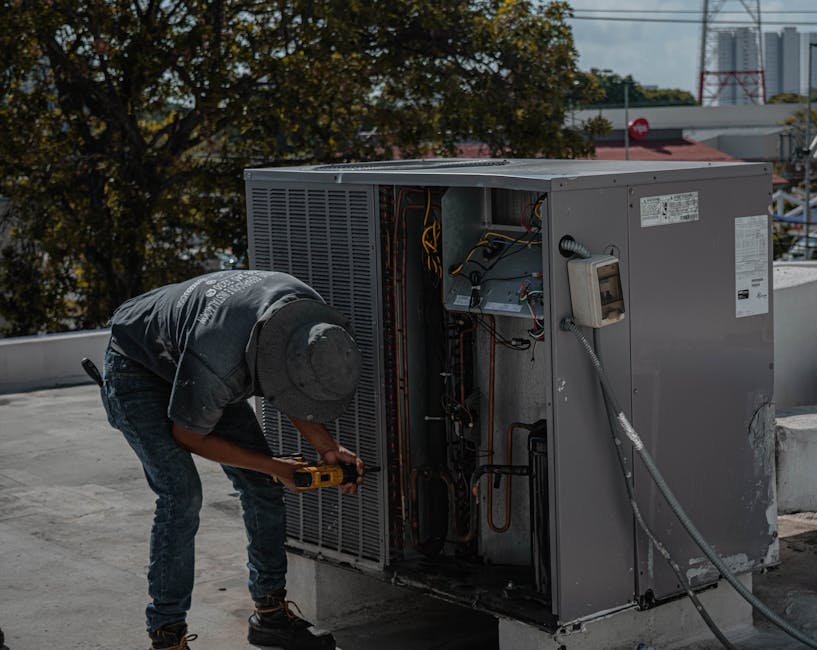
What Causes Your Air Conditioner's Evaporator Coil to Freeze in Palm Desert?
In Palm Desert, a working air conditioning system is more than a convenience—it is a daily necessity. With extended summer heat and little relief, any disruption in your AC’s performance can create real discomfort fast. When cold air stops flowing the way it should, one common cause in this area is a frozen evaporator coil. That might sound unexpected, especially in a place like Palm Desert, but it happens more often than you might think.
A frozen coil can lead your AC unit to blow warm air, struggle to cool your home, or shut down altogether. It is not just frustrating—it is a sign something underneath the surface is not working right. Understanding what leads to this kind of issue can help you respond faster and avoid lasting damage to your system. Here is a closer look at the most common reasons evaporator coils freeze up and what signs to watch for in your Palm Desert home.
Common Causes Of Evaporator Coil Freezing
When an evaporator coil freezes, it is typically connected to one of several mechanical or airflow issues. These problems can build quietly and then appear all at once with noticeable symptoms like reduced airflow, warm air at the vents, or inconsistent cooling cycles. Most of the time, the cause falls into one of a few key categories.
1. Insufficient Airflow
Air needs to move freely over the evaporator coil to keep temperatures stable, and anything that blocks that path can lead the coil to freeze. This is one of the most common issues found during service calls in Palm Desert.
- Dirty or clogged air filters are the top reason airflow gets restricted. If the filter is full of dust and debris, it limits air movement, causing cold air to collect around the coil.
- Blocked vents or closed registers also limit where cooled air can go once it passes through the system, backing up cold air inside the unit.
- A damaged or failing blower fan can slow down or stop air from circulating, reducing pressure and allowing moist air to settle and freeze.
2. Low Refrigerant Levels
Refrigerant carries heat away from your evaporator coil. If levels drop due to a leak or improper filling, the system will not pull out heat effectively. The temperature around the coil dips below the normal operating range. That is when moisture freezes, even during periods of extreme heat outdoors. When this happens, the issue usually will not clear up until the coil is professionally thawed and the refrigerant is recharged or repaired.
3. Thermostat Problems
A malfunctioning thermostat can confuse your system’s control cycles. It might keep the AC running longer than necessary or fail to regulate indoor temperature properly. In both cases, the system ends up overworking, running too cold, and freezing the evaporator coil. Programmable thermostats that are outdated or have sensor issues can make this problem worse in Palm Desert, where high ambient temperatures put added strain on cooling systems.
Each of these problems may seem minor at first, but when they affect the coil, they can cause a bigger breakdown over time. Recognizing these signs early gives you a better chance to avoid a complete system failure or an expensive repair. The sooner you catch it, the sooner our technicians can address it with the right solution.
Identifying Symptoms Of A Frozen Evaporator Coil
When your air conditioner is not keeping up with the heat in Palm Desert and warm air blows from the vents, a frozen evaporator coil could be part of the issue. Spotting the signs early can help limit downtime and protect the system from more serious damage.
The most common symptom is a drop in cooling efficiency. You might notice that the system is running constantly but not cooling effectively. Maybe your thermostat is set the same as always, but the indoor temperature keeps rising. If the air conditioner feels like it is doing half the job it used to, that is a reason to investigate further.
Another clear warning is ice buildup on the indoor unit. Homeowners may notice frost or a layer of ice forming around the access panel or copper lines. In more advanced cases, you might even see water dripping around the indoor portion of the system as the ice begins to melt. Some homeowners have even mistaken melting coil ice for plumbing leaks. That type of issue often points directly to a freezing coil.
Other possible symptoms include:
- Reduced airflow or weak air movement through vents
- Short cycling, where the unit turns on and off quickly without cooling efficiently
- Strange hissing or bubbling noises if there is a refrigerant problem
- Moisture collecting around the air handler
These signs do not always mean the coil is the issue, but having more than one appear at the same time is something that should not be ignored. Allowing the system to keep running while frozen can lead to damage in the compressor or other internal parts.
Preventative Measures To Keep Your Coil From Freezing
Catching problems early is one way to avoid repair costs. Full system prevention works better when basic steps are followed consistently. Routine maintenance and habit changes can make a big difference during peak cooling seasons in Palm Desert.
Start with these three steps:
1. Replace Air Filters Often
A clean filter helps your system breathe. Dirty filters limit airflow and create cold buildup that makes freezing more likely. Every home is different, but in warmer places like Palm Desert, your unit runs more often, so more frequent filter changes are needed. Check filters every month and replace them if they look dirty or clogged.
2. Keep Air Vents Clear
Blocked or closed vents throw off airflow balance. When rooms are not ventilated correctly, pressure builds up in the system. That strain can reduce airflow across the coil and lead to icing. Make sure furniture, rugs, or curtains are not covering vents, and keep them open—even in lesser-used rooms.
3. Stay on Top of Regular Inspections
Even if the system sounds normal, small issues can build up over time. Routine service visits allow our professionals to catch early signs of refrigerant leaks, fan problems, or coil buildup. A yearly check helps keep components adjusted and coils running smoothly.
Preventing coil freezing often comes down to habits. Skipping a filter change, letting vents remain blocked, or running an outdated thermostat too long can impact temperatures around the coil. Regular care helps stop those hidden problems before they grow and affect comfort or performance.
Knowing When It's Time To Call A Professional
If your AC system freezes more than once or does not respond after a filter change or vent check, then the issue is likely beyond a quick fix. Refrigerant levels may need inspection, parts could be failing, or humidity controls could be unbalanced. That is when calling our technicians is the right step.
An experienced technician can locate refrigerant leaks, test airflow, and monitor coil temperatures using proper equipment. These are not issues that can be resolved with guesswork or minor adjustments. More importantly, calling before damage spreads can protect other parts of the system. If the compressor fails due to stress caused by a frozen coil, the repair becomes more extensive or may lead to a full replacement.
Call our professionals when:
- The system freezes more than once within a month
- There are repeated leaks or pooled water around the unit
- Adjusting airflow and settings does not restore cooling
- There is little to no air from vents, even while the unit is running
Once ice forms on your coil, the equipment is already outside normal conditions. The priority should be ensuring long-term performance through deep system checks and necessary repairs. If warm air persists for more than a day, especially during Palm Desert heat, having our team inspect the system is your best option.
Don’t Let A Frozen Coil Interrupt Comfort In Palm Desert
A frozen evaporator coil often happens at the worst time. During the peak of summer, your AC system is expected to work the hardest. Problems like low airflow, thermostat false readings, or small refrigerant leaks can happen silently and then quickly get worse. Something as simple as forgetting a filter change or closing off a room vent can lead to trouble that affects every room in your home.
No one wants to be uncomfortable in the heat while wondering what failed inside their cooling system. Whether it is August or any warm week in Palm Desert, frozen coil issues should always be taken seriously. Timely inspections, good maintenance habits, and keeping an eye on airflow go a long way toward keeping your AC running as it should.
But when the early signs go untreated or troubleshooting does not bring results, expert help becomes necessary. Calling in the right team helps prevent further system damage and restores comfort sooner. Assistance from our professionals keeps systems dependable, efficient, and ready for the long Palm Desert cooling season.
When your air conditioner struggles to keep up with Palm Desert heat and quick action is needed, trusted professionals can help restore your comfort. Consider expert AC repair in Palm Desert from Absolute Air Conditioning & Heating to address issues like frozen coils before they lead to serious breakdowns. For a quick estimate or to book a service visit, please contact us today.
Serving the Entire Coachella Valley


Beat the Heat: Same-Day & 24-Hour AC Repair Services Near You
Facing an AC emergency in Indian Wells? Get fast, reliable 24 hour AC repair Indian Wells services to restore your cool and safety now.

Palm Desert's Best Air Duct Cleaners: A Fresh Air Guide
Breathe cleaner air! Learn why air duct maintenance in Palm Desert is essential for health, energy savings, and a dust-free home.

Palm Springs AC Installation: How to Choose the Best Service for Your Home
Need air conditioner installation Palm Springs? Learn to choose the best AC system & professional installer for desert comfort & efficiency.

